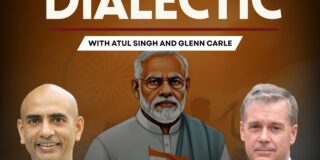In this episode of Soonish, we start from one simple idea: On a planet that will likely be home to 10 billion people by 2050, we’re going to have to think about replacing a lot of the meat we currently get from pigs, chickens, cattle and fish with other forms of protein. We take a close look at where alternative-protein technology is going in the near future, and what those other forms might be. And we talk with people who are starting to think about the best ways to package and promote alternative-protein products.
There are all sorts of reasons why we’re probably approaching the point of “peak meat,” after which consumption of meat from farm animals will have to go down.
The biggest one is the environment. If everyone got as much of their protein from meat as denizens of Western countries currently do, there simply wouldn’t be enough land or water to raise all the needed animals. On top of that, we know that livestock agriculture is a major contributor to global warming. (When you count up the carbon dioxide emissions from deforestation, feed production and farm transportation, and add in methane generation from belching cows and decaying manure, livestock accounts for as much as 18% of overall greenhouse gas emissions, according to the UN Food and Agriculture Organization.)
And that’s to say nothing of the nutritional benefits of a diet that’s higher in plant-based foods, or of ethical concerns, shared by many, about the way farm animals are raised and slaughtered.
But this episode doesn’t dwell on the case for (or against) vegan or vegetarian diets.
Rather, we ask: In a future where there’s a rising demand for protein — or at least for a meaty centerpiece for each meal — what sources will be available other than traditional ones like fish, chickens, pigs and cattle? And we look deeply into three answers.
1) Fiber-rich plants like jackfruit: In this episode we talk with Annie Ryu, who started The Jackfruit Company to buy jackfruit from farmers in India and package it for consumers in America. And we get some perspective on Annie’s success from Adam Salomone, a food-tech industry observer and CEO of The Food Loft, a Boston-based coworking space for food and technology companies.
2) Insects: We visit Tiny Farms, a startup in California working to develop an industrial-scale way to farm tropical house crickets, an excellent source of protein (whether eaten plain or ground up as cricket flour for use in products like energy bars).
3) Cultured meat: Researchers in the burgeoning field of cellular agriculture are beginning to learn how to immortalize muscle cell lines from animals and grow them, under controlled conditions, into edible muscle tissue. Our introduction to this field comes from Natalie Rubio, a PhD student in biomedical engineering at Tufts University who is the very first graduate student to receive a research fellowship from New Harvest, a New York-based nonprofit promoting cellular agriculture.
There’s a fourth alternative as well: plant-based “imitation meat” from companies such as Beyond Meat and Impossible Foods. These products, often built around proteins from soy or peas, are marketed as meat look-alikes and taste-alikes. And while they’re perfectly tasty (as my dinner guests can tell you), these companies may be stumbling unintentionally into the culinary equivalent of the uncanny valley.
That’s an idea from robotics that says people like mechanical-looking robots just fine, but they start to get creeped out by robots that look almost-but-not-quite-human. (The same goes for animated characters.) In a similar way, the harder companies try to make plant-based products look and taste like meat — going so far as to add “blood” from beets or plant-derived heme — the harder it may be for them to win over committed meat-eaters.
As Fast Company reporter Jessica Leber writes, these companies are “trying to convince the carnivore’s stomach, rather than his heart or mind, that he should eat less meat.” But the stomach knows the difference — and if the stomach rules, plants will lose. Veggie burgers will have to be better than meat to succeed in the marketplace, Leber and others argue. And so far, they’re just not.
“At best, assuming some amazing discoveries and research, the Impossible Foods burger will be merely as good as something literally everyone already has access to,” writes Dan Nosowitz at Modern Farmer. “This is a huge problem … imitation is never a good selling point.”
Beyond Meat and other plant-based “meat” products are important as part of an overall mix of meat alternatives. I agree with Natalie Rubio, who says in this episode: “Animal agriculture is such a huge, massive, impending problem that we need to come at it from all angles. We need so many people working on every possible type of solution as fast as possible, so that we can take away these negative impacts that are happening to our planet.”
A decade or two from now, people may be eating some plant-based simulated-meat products in place of meat from livestock. But they’ll also be eating new foods like jackfruit that can take the place of meat in a main dish, and insects, and actual meat that comes from laboratories. Today’s episode tries to offer a glimpse into that world.
*[This podcast was originally featured by Soonish.]
The views expressed in this article are the author’s own and do not necessarily reflect Fair Observer’s editorial policy.
Photo Credit: Drew Rawcliffe / Shutterstock.com














Commenting Guidelines
Please read our commenting guidelines before commenting.
1. Be Respectful: Please be polite to the author. Avoid hostility. The whole point of Fair Observer is openness to different perspectives from perspectives from around the world.
2. Comment Thoughtfully: Please be relevant and constructive. We do not allow personal attacks, disinformation or trolling. We will remove hate speech or incitement.
3. Contribute Usefully: Add something of value — a point of view, an argument, a personal experience or a relevant link if you are citing statistics and key facts.
Please agree to the guidelines before proceeding.